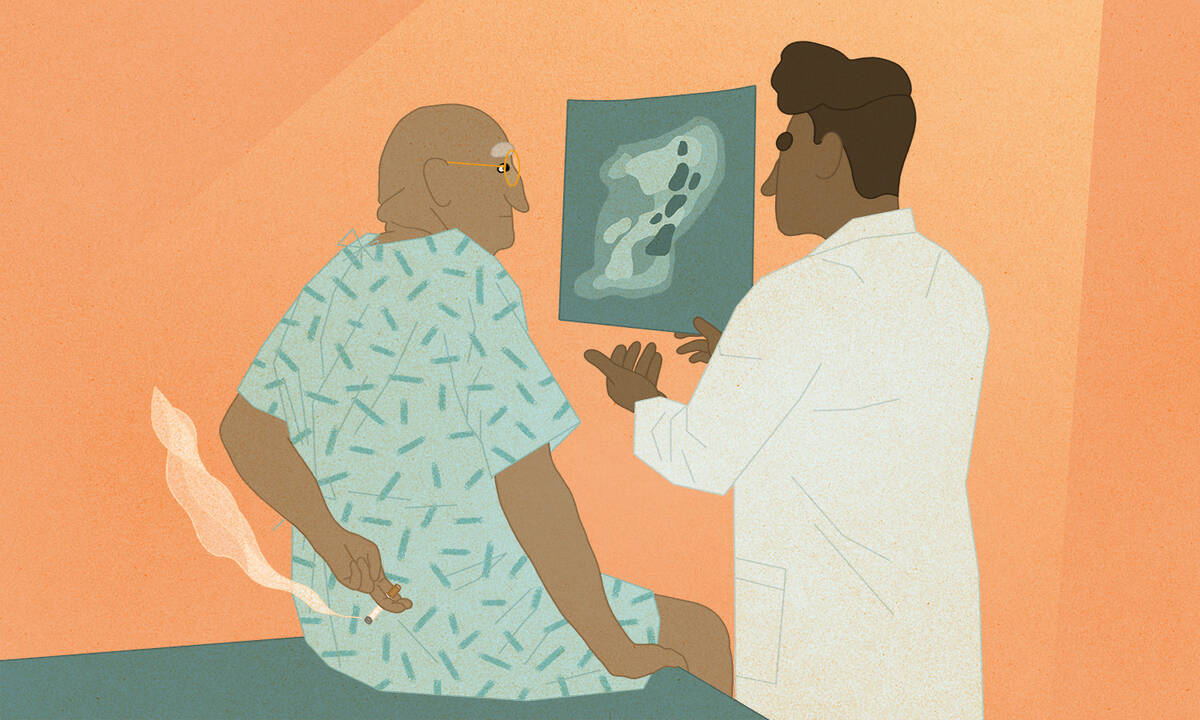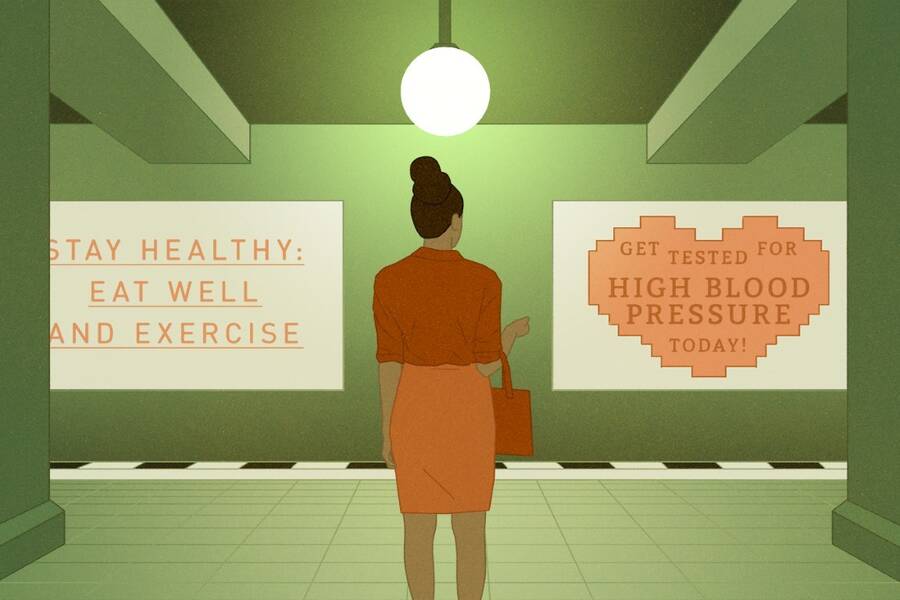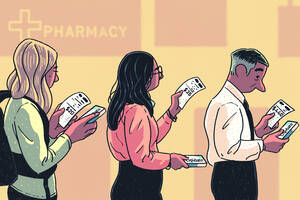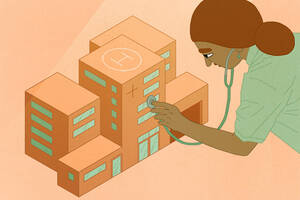Healthcare Apr 1, 2022
How Social Stigma Can Dissuade Us from Taking Care of Our Health
A new study explores the decisions that go into seeking preventative care.

Lisa Röper
Sometimes maintaining a good opinion of ourselves gets in the way of taking care of our health.
That’s the conclusion of recent research by Chethana Achar, a Kellogg assistant professor of marketing.
Achar wanted to understand whether our desire to protect our own self-image would make us less likely to take healthy actions if the associated health problems were directly tied to stigmatized behaviors.
Take cervical cancer, for example. “Regular screening for cervical cancer is a healthy, beneficial practice,” she says. “But then having multiple sexual partners, which is a risk factor for cervical cancer, is stigmatized in many societies. In such societies, some people may compromise their own health to avoid being associated with something others think is ‘bad.’”
Achar and collaborators Lea Dunn and Nidhi Agrawal, both at the University of Washington, used that logic as the basis for a series of studies of how stigmatized risk factors affect our willingness to keep ourselves healthy.
The researchers found that social stigma surrounding some health risk factors, such a smoking, being overweight, or having multiple sexual partners, can have a direct impact on how we think about and address our health. Specifically, people who define their identity around being a good person—what Achar calls “high moral identity”—may decide to engage in health behaviors depending on whether the associated risk factors are stigmatized.
Across five studies, the researchers showed that when a health-related message, like a public service announcement about lung-cancer screening, mentions a stigmatized risk factor, it “taints” the morality of the healthy behavior that the message is advocating. And this makes people less likely to engage in the behavior when it threatens their moral sense of self.
“We show that people make trade-offs where they choose to protect the moral self by not getting the help that they may need,” Achar says. “You can either be a ‘good person,’ they may think, or a not-so-good person who goes to get help with a disease that has stigmatized risk factors.”
Manipulating Morality and Stigma
The researchers conducted five studies where they varied both the extent of the stigma associated with the health-related risk factors and the sense of moral identity participants were induced to feel.
For example, several studies showed participants messages related to cancer screening. In one of those experiments, some participants were first asked to write about themselves using moral personality traits (to prime a sense of moral identity), while others wrote about themselves in more general positive terms. Next some participants read a newspaper article about the stigma associated with smoking, while others read an article about a neutral subject such as the history of coffee. Then all participants viewed an advertisement related to lung-cancer screening, which mentioned smoking as a risk factor.
In another experiment, some participants were shown a cancer-screening ad that emphasized high-stigma risk factors like smoking, while others saw ads that emphasized low-stigma factors, like exposure to pollution.
Overall, results showed that people primed with a moral sense of self were more likely to say they would use a lung-cancer screening tool when they were not reminded of the stigma associated with risk factors like smoking. And this same group was less interested in the screening when those stigmatized factors were made salient.
“The moral self makes someone more likely to act in a healthy way, but then stigma is this bad thing that takes away the virtuosity of health behaviors.”
— Chethana Achar
Interestingly, the participants’ sense of moral identity changed how they perceived their actual risk of lung cancer. Participants in the high-stigma condition estimated their risks of lung cancer as almost 20 percent lower when they were primed with moral identity, versus those not primed in this way.
“Theoretically,” Achar says, “everyone should estimate the same risk. But when they define themselves as a ‘good’ person, they’re telling themselves, ‘I’m not the kind of person that gets this disease.’”
This perception of risk in turn impacted how much time participants spent on a screening tool that was embedded in some of the studies. “They spend less time on the tool if they think they’re not the kind of person who gets that kind of cancer,” Achars says. “‘I don’t need this screening,’ they’re saying.” And this, of course, increases the risk that they will end up with a health problem.
Morality and Health
“One of the important contributions of this paper is to link the moral self with health,” Achar says.
Indeed, on one hand the results show that our sense of moral self can motivate us to behave in ways that are good for our health. People primed with moral identity were more likely to do something healthy than those who hadn’t been primed, like intending to get a vaccination for a fictitious disease they had been told about. “Someone who cares about being a good person wants to take care of themselves, because being healthy is virtuous,” she says. “Being healthy is virtuous from a self-control perspective, because it means you can resist things that are not good for you. But healthiness is also virtuous from a public-health perspective. Historically, healthy people reduced spread of diseases and created better-functioning, more-productive societies.”
But the link between morality and health gets broken when stigma comes into play, as the results showed. “The moral self makes someone more likely to act in a healthy way, but then stigma is this bad thing that takes away the virtuosity of health behaviors,” Achar says.
A natural implication of the findings, then, is that health-related messages that highlight stigmatized risk factors might diminish people’s motivation to choose the healthier option. So public-health organizations might be smart to avoid mentioning smoking in messages encouraging cancer screenings, or obesity in messages encouraging diabetes interventions.
Stigmatization and Ideology
This link between morality and health could also factor into the battle over COVID-19 mitigation measures—particularly when it comes to forms of vaccine hesitancy.
“A large body of literature shows that political identity is inherently about moral beliefs, because ideology is one’s sense of how an ideal society should be run.” Achar says. “In that way, whatever is ideologically consistent could seem like a moral or ‘good’ behavior.”
In the case of COVID, many mitigation behaviors, such as masking and vaccinating, have become stigmatized in some circles. “The stigmatization is again a threat to people’s view of themselves as a good person. They worry about the social cost, or ‘What does this say about me?’”
This suggests that, just as public-health organizations wishing to advocate for a health behavior such as lung-cancer screening should redirect attention away from stigmatized risk factors like smoking to innocuous risk factors like pollution, public-health organizations would be wise to redirect vaccination advocacy away from associations or reminders about ideology.
Sachin Waikar is a freelance writer based in Evanston, Illinois.
Achar, Chethana, Lea Dunn, and Nidhi Agrawal. 2022. “Tainted by Stigma: The Interplay of Stigma and Moral Identity in Health Persuasion.” Journal of Marketing Research. 59(2):392–410.



